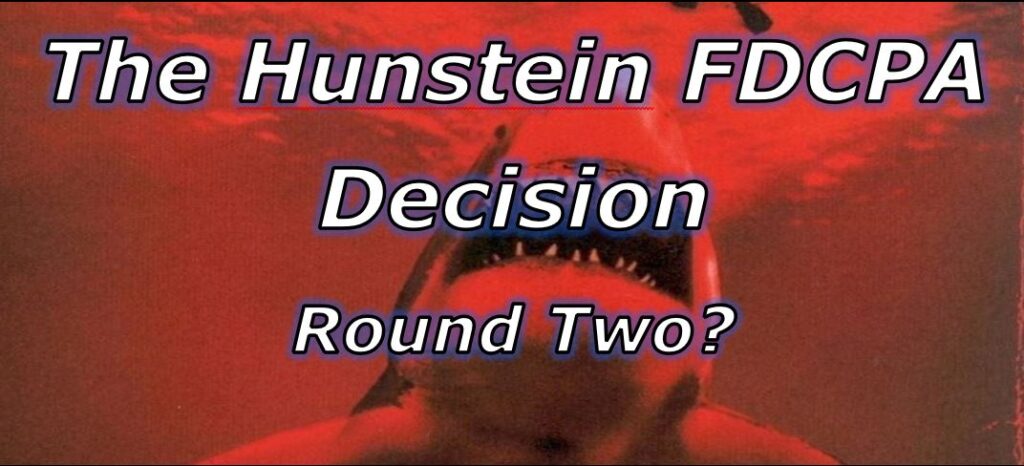
“because the Court’s decision prohibits not only third-party debt collectors, but the entire financial services industry—including banks, credit unions, and mortgage companies—from using third-party service providers that are vital to servicing of loans.”
If you have or had any doubts that the April 21, 2021 Eleventh Circuit FDCPA decision on Hunstein v. Preferred Collection and Management Services, Inc. was a collections industry killer, then perhaps you should take a look at the unlikely alliances joining forces to file joint Amicus Briefs in opposition to it.
At issue, is the applicability of the Fair Debt Collections Practices Act’s (FDCPA) application of third-party disclosure violations, a statutory violation of Section 1692c(b), being applied to the use of a third-party mailing service for the purposes of contact with debtors.
This industry wide practices has riled up not only the ACA and accounts receivable industry, but both the Credit Union National Association (CUNA) and the American Bankers Association (ABA), long standing and often bitter rivals, usually over credit union’s untaxed not for profit status.
“The panel’s broad reading of Section 1692c(b) renders the statute in violation of the First Amendment. In fact, under the panel’s interpretation, Section 1692c(b) may be the most burdensome restriction on commercial speech in the federal code,” the brief reads. “Yet this heavy restriction cannot be justified by the promise of advancing a substantial interest in a tailored manner.”
CUNA and the other organizations note that the rehearing before the entire circuit is required, “because the Court’s decision prohibits not only third-party debt collectors, but the entire financial services industry—including banks, credit unions, and mortgage companies—from using third-party service providers that are vital to servicing of loans.”
June 1, 2021 was the deadline for the filing of Amicus Briefs (friend of the court) in opposition to the Hunstein decision in the 11th circuit court. Attorneys must have been working all through the Memorial Day weekend, because no less than 13 briefs were filed just before this deadline.
Briefs were filed by the following organizations, associations, and companies:
- Credit Union National Association, American Bankers Association, American Financial Services Association, Chamber of Commerce of the United States, Consumer Bankers Association, Housing Policy Council, Mortgage Bankers Association
- ACA International
- New York State Creditors Bar Association
- Transworld Systems, Alltran Financial, Nationwide Credit, Radius Global Solutions, NGI Acquisitions, Credence Resource Management, Phoenix Financial Services, Pendrick Capital Partners, Affiliate Asset Solutions, Capio Partners, CF Medical, AssetCare, The Law Offices of Mitchell D. Bluhm & Associates
- American Association of Healthcare Administrative Management
- Revspring
- Missouri Creditors Bar Association
- Arizona, Alabama, California, Colorado, Nevada, Delaware, Georgia, Illinois, Kansas, Maryland, Michigan, Minnesota, New Jersey, New Mexico, North Carolina, Ohio, Pennsylvania, Texas, and Virginia Creditors Bar Associations
- National Association of Process Servers
- Consumer Relations Consortium
- RMA International
- Third Party Payment Processors Association
- LiveVox
Since the Hunstein decision on April 21, no less than 120 lawsuits, mostly class action, have been filed by consumer attorneys nationwide, with a third of those filed within the 11th circuit itself, which covers the southern states of Florida, Georgia and Alabama. The state of New York already has more filings than the 11th circuit states put together, and even more states have joined in.
On May 25th, Preferred Collection and Management Services, Inc., defendant in this radical decision, filed its petition for a rehearing en banc. Preferred is asking that the 11th Circuit grant a “panel rehearing or, rehearing en banc, of the panel’s decision. En banc is French for “in the bench,” which signifies a decision by the full court of all the appeals judges in jurisdictions where there is more than one three or four-judge panel.
If at least one of these judges votes in agreement with the rehearing, then another vote is held to determine if the majority agree. If the petition passes this vote, the court will grant the en banc petition and re-hear the case. During the ensuing potential rehearing the full bench will take the case into consideration as to whether they agree with the original ruling. Likewise, they could also reach another conclusion.
Not surprisingly, the CFPB has remained silent on this ruling, despite that in numerous bulletins and issued guidance through the years, they have recognized and addressed the vendor mailing process and have had no issues with it.
Now that petitions and briefs in opposition have been filed, it is a waiting game to find out when they might render a decision on this matter and what that will be.
Should they opt to not rehear this case, absent at least two dissenting circuit court opinions, this ruling becomes the law of the land. The remaining options to overturn this ruling reside in the hands of the Supreme Court, IF they would choose to hear it.
And of course, there is the legislative route through Congress (eyes rolling). Mind you, this is highly improbable considering their support for the national economy crushing and disastrous collections and repossession focused bill now in Senate, H.R. 2547 (Comprehensive Debt Collection Improvement Act.)










